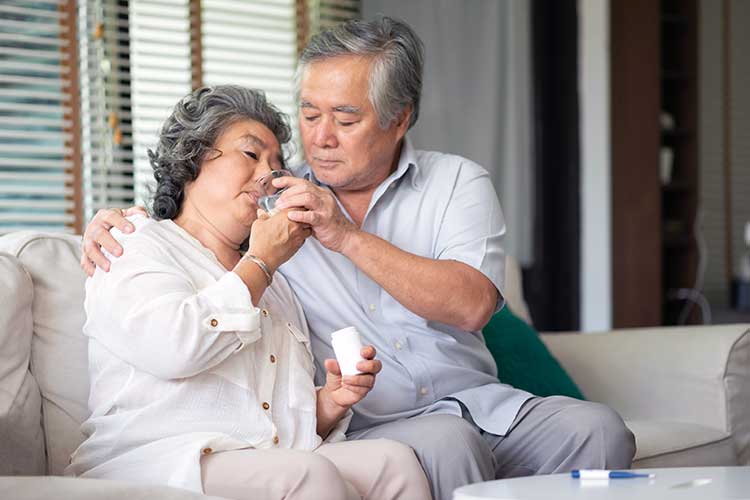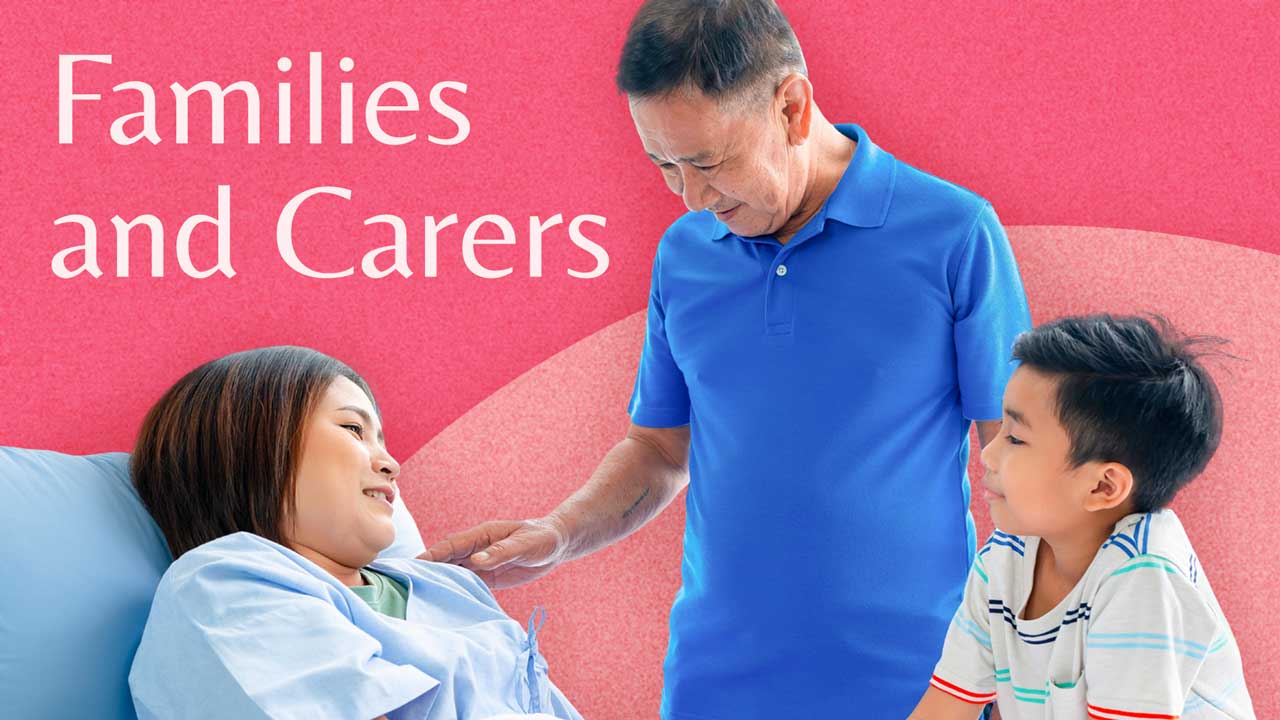Families and carers know clients better than anyone else.
Partnering with clients and involving them in their own care is an essential component of healthcare standards, but the information gained about their background and preferences may be limited, especially if the client is physically or cognitively compromised.
As well as being able to recognise physical and behavioural changes, family members and carers will also generally have a much greater understanding of the client’s gestures, movements, body language, personality and thoughts (Boyle 2015).
Even if the client is able to actively participate in their own care, families and carers still play a critical role that should be acknowledged and included in the care process.
A key consideration to keep in mind is that families and carers knew clients when they were well. Healthcare staff generally only meet clients when they are unwell (Mind Australia and Helping Minds 2016).
Families and carers often know what issues the client is facing, how to manage situations and whether there are any warning signs to look out for (Mind Australia and Helping Minds 2016).
Note: It is important to remember that you must always receive informed consent from the client, even when partnering with their loved ones (Mind Australia and Helping Minds 2016).
Who Are Carers?

Around 2.65 million Australians are carers in some capacity (DSS 2023).
A carer provides support and care, in an unpaid capacity, to a person living with disability, mental illness or a chronic health condition, or an older adult with care needs (Carers Victoria 2023a).
Cares may provide support with personal care activities, transport, shopping, domestic duties, giving medications and other tasks (Carers Victoria 2023a).
They may include:
- Family members (e.g. parents, siblings, children, grandparents, cousins, aunts, uncles)
- Partners and ex-partners
- Friends
- Housemates and neighbours.
(Mind Australia and Helping Minds 2016)
Person and Family-Centred Care
Person and family-centred care is the practice of allowing both clients and their loved ones to actively participate in the care process where appropriate. Person and family-centred care means families and carers are:
- Treated with dignity and respect
- Provided with information that is accurate, timely, relevant and evidence-based
- Supported to participate in the client’s care to the extent they wish
- Supported to contribute to policy development, health service design and service delivery and evaluation.
(Health.vic 2014)
Benefits of Person and Family-Centred Care
- Early recognition of warning signs that healthcare staff may be unable to detect on their own (e.g. changes in behaviour)
- Increased understanding of the client’s medical history (which, in turn, reduces the risk of falls, medication errors and pressure injuries etc.)
- Insight into interventions that may be beneficial to the client
- Decreased client anxiety
- Quicker recovery
- Decreased medication requirements
- Lower mortality rates
- Decreased readmission rates
- Decrease in healthcare-associated infections
- Reduced hospital stays
- Increased adherence to treatment
- Improved preventative care
- Improved functional status.
(Health.vic 2014; RCHM n.d.)
Challenges Faced by Families and Carers

It’s important to remember that families and carers may experience their own challenges while their loved ones are receiving care. They may be scared and confused or have difficulty coping. They might worry about what this situation will mean for them and their loved one, and what others will think. For this reason, it is important to establish a supportive partnership with families and carers and treat them with respect (Health.vic 2014; Mind Australia and Helping Minds 2016).
Families and carers often feel that their role in the care process is not acknowledged and that they lack necessary information, support and skills (Health.vic 2023). This is on top of other challenges, including:
- Financial hardship (an estimated 50% of carers are on a low income, and many require extra costs to care for their loved ones)
- Emotional and physical exhaustion
- Physical and mental difficulties linked to caring (e.g. back pain, anxiety, depression)
- Social isolation
- Strong emotions such as guilt, anger, grief and distress
- Loss of opportunities
- Loss of freedom.
(Carers Victoria 2023b)
Communicating with Families and Carers
Despite not receiving care themselves, families and carers may have concerns, questions and thoughts of their own. Treating loved ones with dignity and respect and ensuring they feel ‘heard’ can go a long way - it is important that they feel their presence and contributions matter (Boyle 2015).
It is also important to acknowledge the unique knowledge, values, beliefs, and experiences that families and carers may hold (RCHM 2014).
The following are some practical tips for communicating with families and carers:
- Introduce yourself, your name and your role
- Use interpreters if needed so families and carers can communicate comfortably
- Consider the person’s culture, ethnicity, religion and gender identity
- Respect privacy and confidentiality
- Explain medical jargon and acronyms
- Present concepts in a way families and carers will understand
- Ensure any instructions given are clear and concise
- Respect the level of participation that each person is comfortable with
- Ensure you communicate clear information about procedures, visiting times etc.
- Share information that families and carers may find helpful
- Consider both what you are saying as well as how you are saying it
- Speak gently, using the person’s name as well as the name of the client
- Build a sense of trust
- Give realistic expectations
- Even if you are unable to answer a question, taking the time to listen is still appreciated
- Use ‘teach back’ or ‘show back’ strategies to encourage health literacy among families and carers.
(RCHM n.d.; Boyle 2015; Clay & Parsh 2016)

Conclusion
When caring for clients, it is important not to neglect the valuable insight that can be provided by families and carers. While they may not be receiving care themselves, their close relationship with the client means they can play a unique and integral role in the care process.
For this reason, you should not only facilitate the opportunity for families and carers to participate in the client’s care, but also ensure they feel respected and listened to - as this will help to improve the client’s overall care outcome.
Test Your Knowledge
Question 1 of 3
True or false: Financial hardship is prevalent among carers.
Topics
References
- Boyle, B 2015, ‘The Critical Role of Family in Patient Experience’, Patient Experience Journal, vol. 2 no. 2, viewed 17 August 2023, https://pxjournal.org/cgi/viewcontent.cgi?article=1112&context=journal
- Carers Victoria 2023a, Am I a Carer, Carers Victoria, viewed 17 August 2023, https://www.carersvictoria.org.au/how-can-we-help-you/where-to-start/am-i-a-carer
- Carers Victoria 2023b, Impact of Caring, Carers Victoria, viewed 17 August 2023, https://www.carersvictoria.org.au/about-us/impact-of-caring
- Clay, AM & Parsh, B 2016, ‘Patient- and Family-Centered Care: It’s Not Just for Pediatrics Anymore’, AMA Journal of Ethics, viewed 17 August 2020, https://journalofethics.ama-assn.org/article/patient-and-family-centered-care-its-not-just-pediatrics-anymore/2016-01
- Department of Social Services 2023, Supporting Carers, Australian Government, viewed 17 August 2023, https://www.dss.gov.au/disability-and-carers/carers
- Health.vic 2014, Standard 2 Person and Family Centred Care (Partnering with Consumers) Module, Victoria State Government, viewed 17 August 2023, https://www.health.vic.gov.au/publications/standard-2-partnering-with-consumers
- Health.vic 2023, Working Together With Families and Carers, Victoria State Government, viewed 17 August 2023, https://www2.health.vic.gov.au/about/key-staff/chief-psychiatrist/chief-psychiatrist-guidelines/working-together-with-families-and-carers
- Mind Australia and Helping Minds 2016, A Practical Guide for Working with Carers of People with a Mental Illness, Mind Australia and Helping Minds, viewed 17 August 2023, https://www.mindaustralia.org.au/sites/default/files/publications/A_practical_guide_for_working_with_people_with_a_mental_illness.pdf
- The Royal Children's Hospital Melbourne n.d., Patient and Family Centred Care, RCHM, viewed 17 August 2023, https://www.rch.org.au/policy/public/Patient_and_Family_Centred_Care/
 New
New 
